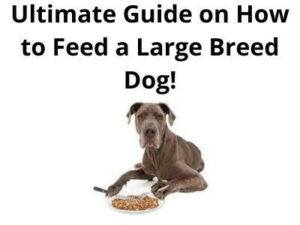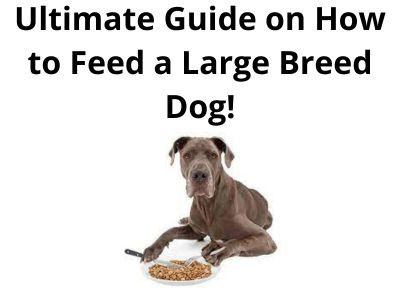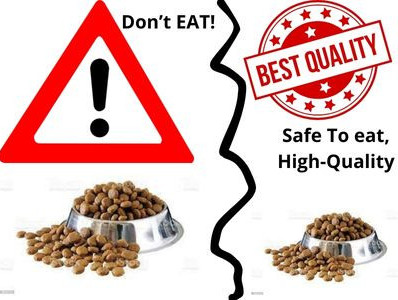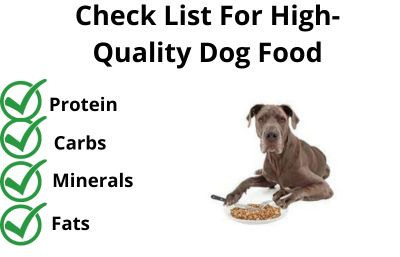This post contains affiliate links. If you use them, we may earn a commission at no extra cost to you. Thanks for your support!

When it comes to Feeding Large Breed dogs, it’s essential to understand that not all dog foods are created equal. Large breeds have unique nutritional needs, and the quality of the dry dog food you choose can significantly impact their health and well-being.
The Unique Nutritional Needs of Large Breeds
Large breed dogs, due to their size and build, require a different nutrient balance than smaller breeds. They need more protein to support muscle mass and specific minerals to maintain strong bones. Its crucial to choose a dog food tailored to these needs to ensure optimal health.
Size and Build: Why It Matters
Dogs of larger breeds stand out not just because of their size but also their robust build. This distinction is not just physical; it translates to their internal nutritional requirements as well.
Protein: The Muscle Builder
A heightened protein intake is not a luxury but a necessity for these breeds. It ensures they maintain their substantial muscle mass, which is integral to their overall health and vitality.
Minerals: The Bone Fortifiers
Beyond protein, certain minerals play a pivotal role for these breeds. These minerals fortify and sustain their sturdy skeletal structure, ensuring they remain active and agile. Which in simple words makes your dog healthier.
The Importance of Tailored Dog Food
Given these specific needs, it’s not just about feeding them; it’s about nourishing them. Opting for a dog food that is meticulously formulated for these requirements is not just a choice but a responsibility for pet owners, guaranteeing the best possible health outcomes for these magnificent canines.
For our canine companions, nutrition goes beyond the act of simply feeding. Its about providing them with the nourishment they need to thrive, ensuring they lead a healthy and active life.
Choosing a dog food isn’t merely about picking any product off the shelf. Its about selecting food that’s been carefully and meticulously formulated to meet the unique requirements of our pets. This isn’t just a choice—it’s a responsibility every pet owner must embrace.
Risks of Poor-Quality Dry Dog Food for Large Breeds
Feeding your large breed dog a low-quality dry dog food can lead to numerous health issues. These can range from digestive problems to more severe conditions like joint issues or heart diseases. Its not just about filling their stomach; it’s about nourishing their body.
Beyond Basic Nutrition
When it comes to feeding our large breed dogs, it’s essential to understand that it’s not merely about satiating their hunger. Its about providing them with the right nutrients that cater to their unique needs.
Health Implications of Low-Quality Food
Feeding low-quality dry dog food can have detrimental effects on your dog’s health. These issues can manifest in various ways:
- Digestive Problems: Low-quality food might not be easily digestible, leading to gastrointestinal issues.
- Joint Issues: Large breeds are already prone to joint problems. Poor nutrition can exacerbate these issues, leading to conditions like arthritis.
- Heart Diseases: Certain ingredients in low-quality foods can contribute to heart problems, especially in large breeds that might be predisposed to such conditions.
Nourishment Over Filling
Its crucial to understand that feeding your dog is not just about filling their stomach. Its about ensuring they receive the right nutrients to lead a healthy and active life. Opting for high-quality dog food ensures that your pet gets the best possible care through their diet.
How to Choose Quality Dry Dog Food
Quality food is critical for your dogs health. And finding it can be hard, so here is some tips that you can use to find the perfect dog food for your large dog breed.
1. Prioritize Protein Sources
When selecting dog food, the primary ingredient should be a high-quality protein source. This ensures that your dog gets the necessary amino acids for muscle development and overall health.
2. Avoid Fillers
Fillers are often used in low-quality dog foods to bulk up the product without adding nutritional value. These can lead to digestive issues and don’t provide the essential nutrients your dog needs.
3. Essential Vitamins and Minerals
Ensure that the dog food contains a balanced mix of essential vitamins and minerals. These are crucial for bone health, immune system support, and overall well-being.
4. Brand Reputation
Opt for brands that have a reputation for prioritizing the health and nutrition of pets. These brands often have rigorous testing and quality control measures in place to ensure the best possible nutrition for large breeds.
Tips for Feeding Large Breed Puppies
Large breed puppies have even more specific needs. Ensure the food supports healthy bone growth and provides adequate protein. Always follow feeding guidelines and consult with a veterinarian for personalized advice.
Prioritize Bone Health
- Why it’s important: Large breed puppies have a longer growth phase compared to smaller breeds. This means their bones and joints are under stress for a more extended period as they grow to their full size. Proper nutrition is crucial to ensure that their skeletal system develops correctly.
- What to do: Look for dog foods specifically formulated for large breeds. These foods should have the right balance of calcium and phosphorus to support healthy bone growth and prevent issues like hip dysplasia or other skeletal problems.
Adequate Protein Intake
- Why it’s important: Protein is the building block of muscles. As large breed puppies grow, they need ample protein to support their rapid muscle development.
- What to do: Ensure the dog food you choose lists a high-quality protein source, like chicken or lamb, as one of its primary ingredients. The protein content should be appropriate for large breeds, supporting their growth without leading to excessive weight gain.
Avoid Overfeeding
- Why it’s important: Overfeeding can lead to rapid growth, which can put undue stress on a puppy’s developing bones and joints. It can also lead to obesity or overweight, which brings a host of health issues.
- What to do: Stick to the feeding guidelines provided on the dog food packaging. These guidelines are typically based on the puppy’s age and weight. Its also essential to monitor your puppy’s weight and adjust the food intake accordingly.
Consultation with a Veterinarian
- Why it’s important: Every puppy is unique. While general guidelines are helpful, personalized advice can ensure your puppy gets the best nutrition tailored to its specific needs.
- What to do: Schedule regular check-ups with a veterinarian. They can provide guidance on the right type of food, the correct portion sizes, and any supplements your puppy might need. They can also monitor your puppy’s growth and overall health, making adjustments to the diet as necessary.
Conclusion and Feeding Guidelines
In conclusion, Feeding Large Breed dogs the right quality of dry dog food is paramount. Its an investment in their health, happiness, and longevity. Always prioritize quality over quantity and stay informed about your breed’s specific needs. For more insights, check out this comprehensive guide on large breed nutrition.
Here is a full summarize of this whole article:
- The Importance of Quality Dry Dog Food: Dry dog food, when chosen correctly, offers a balanced diet for dogs, ensuring they receive all the essential nutrients in the right proportions. Over the years, the evolution of dry dog food has seen significant improvements in its nutritional composition, making it a reliable choice for pet owners.
- Understanding Your Breed’s Needs: Each dog breed has its unique set of nutritional requirements. Large breeds, in particular, need food that supports their rapid growth, bone health, and muscle development. Its essential to stay informed and choose food tailored to these needs.
- Quality Over Quantity: Its not about how much you feed, but what you feed. A high-quality diet can reduce the quantity of food required, as it’s more nutrient-dense. Always adhere to feeding guidelines to ensure your dog gets the right amount of food.
- Wet vs. Dry Food: While dry food offers convenience and long shelf life, wet food can be a source of hydration and variety in your dog’s diet. Its essential to understand the pros and cons of each to make an informed decision.
- Seek Expert Advice: Your veterinarian is a valuable resource. Regular consultations can provide insights into your dog’s specific needs, ensuring they receive the best nutrition tailored to them.
In conclusion, investing in the right quality of dry dog food for your large breed is paramount. Its a commitment to their health, happiness, and longevity. Prioritize quality, stay informed, and always consult with professionals for the best outcomes. For a deeper dive into large breed nutrition, consider exploring comprehensive guides on the subject.
If there are any questions on to this article then feel free to leave them in the comments and I will answer them all!




